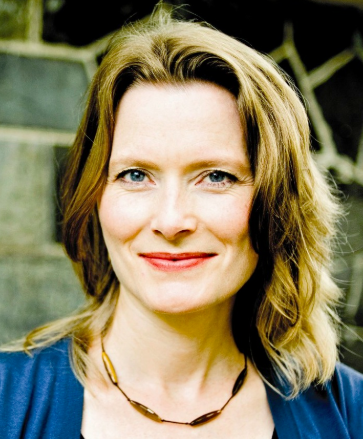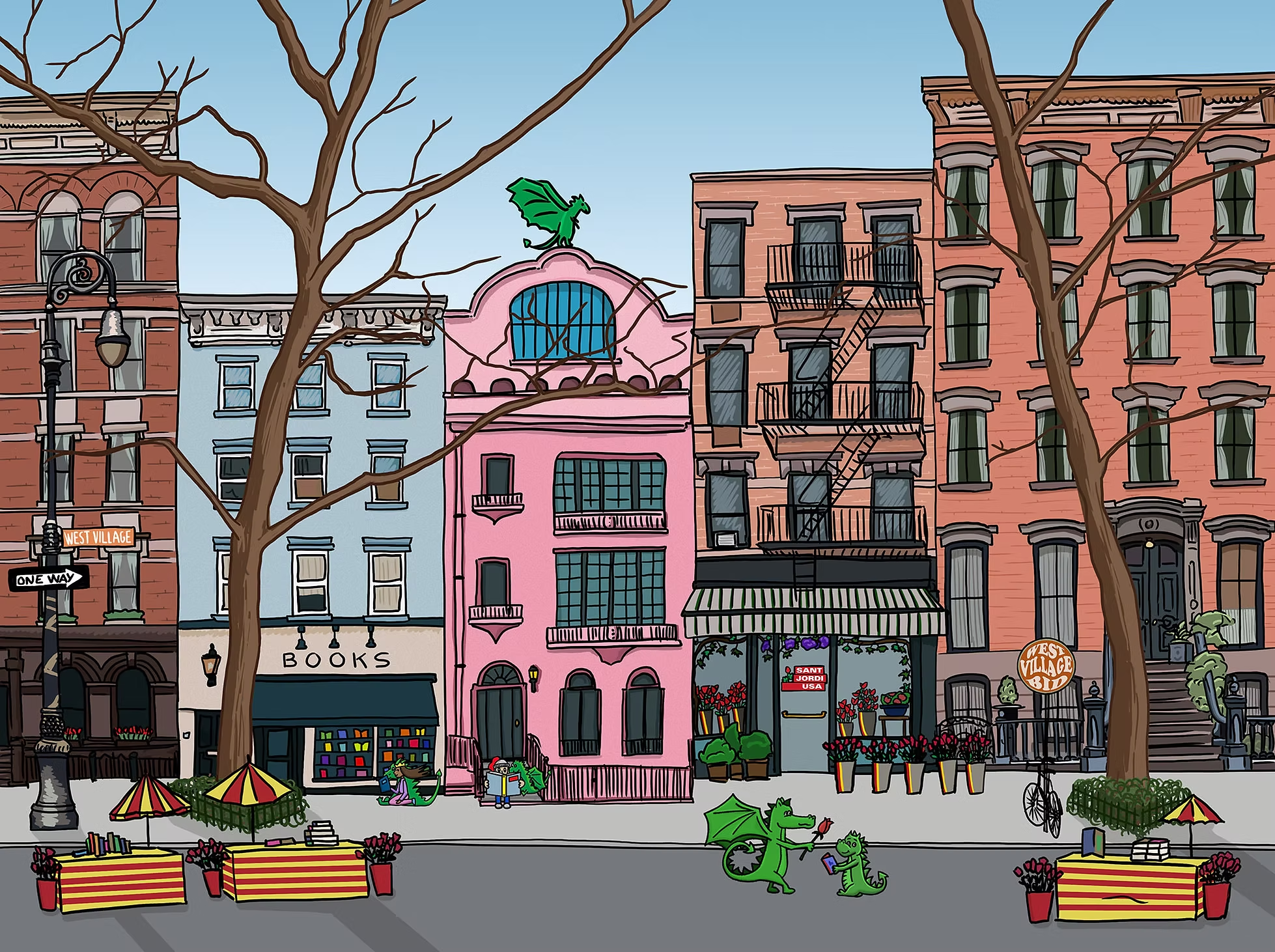On the Friday of LitFest, Amherst College’s annual literary festival, The Common Editor in Chief Jennifer Acker sat down with Jennifer Egan, winner of the Pulitzer Prize for fiction, among other accolades, to talk about crime, place, and “timely” writing. This is an edited version of that live interview from March 1, 2019.
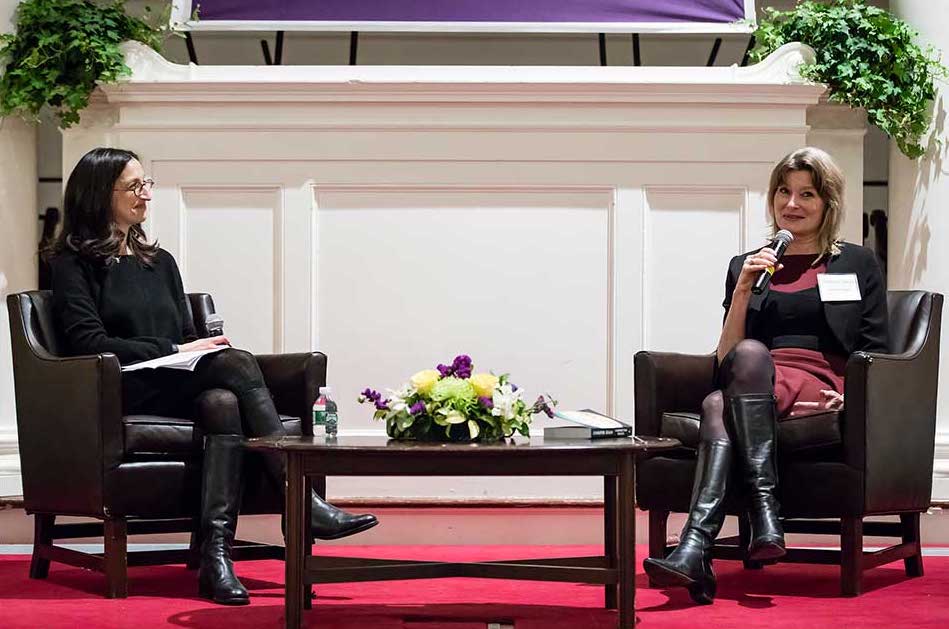
JA: In an early story of yours, “Why China?” there’s a chance encounter in China between two men who are both escaping financial crimes in the U.S. The scene made me think of the opening of A Visit from the Goon Squad, in which one of the protagonists steals a wallet from a hotel bathroom, and of the mobster Dexter Styles, a character in Manhattan Beach. You write about criminals with so much empathy—how do you do this, and what do you find so interesting about them?
JE: My personal relationship to it has to do with my grandfather, who was a cop, and later a commander, on the South Side of Chicago. I think I must’ve imbibed a certain amount of crime lore as a kid, at which point my grandfather was just a very sweet white-haired retired man. My uncle tells a story about watching my grandfather watch people walk by in Chicago, and my uncle said, ‘What are you looking at, Dad?’ and my grandfather said, ‘Just trying to separate the good guys from the bad guys…’
A lot of the crime in Manhattan Beach also has to do with my research. What was really surprising was how many people knew “gangsters.” One man, who grew up fairly wealthy in a building on Central Park, mentioned that he had various illustrious neighbors, including a movie star and Frank Costello, a crime boss. I’m picturing the Coop Board on Central Park today, and I don’t think Frank Costello gets the apartment. *laughs* As I dug deeper, I realized that was all still a post-prohibition moment in which so-called gangsters, i.e. liquor dealers, were part of mainstream life. The presence of gangsters felt inevitable in this book, both because the waterfront was very corrupt, and because of the history of prohibition.
JA: How do you develop those characters? Is there any work you needed to do to make sure you were presenting these characters in a way that allows readers to have sympathy for them while recognizing that what they’re doing is wrong?
JE: I think if I’m going to write about anybody, I have to feel that I can make their choices seem not just reasonable but essential. The fiction writer’s job is to get inside the consciousness of the people they’re writing about, and make the reader understand their choices. I think when people say ‘I didn’t like that character’ what they really mean is that they felt alienated from that character, and that’s a failure on the part of the writing. Especially with characters who are criminals, the interesting question becomes: what else are they like? What are the counter-elements of their personality?
One of the things that I was moved by while reading about these various criminals is that because they were to some degree accepted as gangsters in mainstream society, there was a belief on their part that they could cross back over and be fully accepted. And that was very hard to do.
JA: Recently, you said that your previous fiction had been skewed somewhat towards the male, and that it felt really good to be writing about Anna, the female protagonist of Manhattan Beach. I’m wondering why you think your fiction had been skewed toward the male, and what you mean by that.
JE: The reason I like writing from a male point of view has to do with why I love writing, period, which is that I love the feeling of being delivered out of my self, out of my own life, and into another world. I balk when I start to feel like anything is about myself, or someone like me—and I’m terrible at writing about people I know, so I’ve given that up, much to the joy of my family and friends. Writing from a male point of view immediately creates a barrier between the character and myself. Whenever I feel like I’m developing a path of least resistance I try to resist it, because that’s how you get better.
To me, there’s something that fiction does that no other narrative art form can do. It’s true that the world of images has crowded up our minds, but anything that starts with an image is starting from the outside and trying to suggest inner life. Fiction is about actually knowing the inner lives of other people, and that’s a thrill, because that’s the thing we can never do in real life.
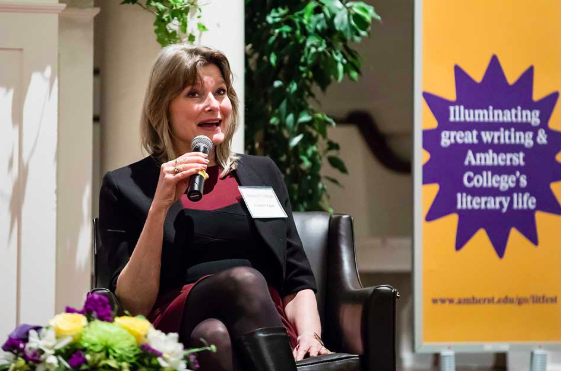
JA: We’ve been talking quite a bit about the development of characters, but you actually say that the way you start a piece of fiction is with a time and a place. I’m wondering about that place-specific inspiration—does it come only from places that you’ve actually been to? How do you go about populating that place with characters?
JE: It’s not always a place I know. So, although I live in New York, Manhattan Beach takes place well before my lifetime. I was longing for a very different moment in American history that I honestly didn’t know very well. Once I feel this inclination toward a place I start researching or writing. In the case of Manhattan Beach, the writing took years to happen, because there was so much learning I had to do before I was able to write with any kind of authority about that time and place. Once I start writing, it feels as if the people arrive pretty spontaneously. The action is really the third thing, because once there are people they do things. When I write first drafts, it’s very instinctive.
JA: And you do these all long-hand.
JE: Yes. There’s something oddly meditative about hand-writing for me. As a journalist, I write almost exclusively on a computer, because then I’m synthesizing huge quantities of information that I’ve acquired and digested over time, and it actually helps me to be looking at it in a typeface right away. But that’s because I’m trying to represent the world or an issue as I’ve seen it and studied it. With fiction, I’m trying to create the world that I’m going to be writing about, and that only works in this tumbling-forward way. Once I type it up and read it and get through several stages of grief over what I’ve read, then I make a detailed outline and work from outlines. It’s getting the material that is so essential. I have to get access to things that I can’t think of consciously, because what I can think of consciously is just not good enough, frankly.
JA: There are some pretty great structural differences between and A Visit form the Goon Squad and Manhattan Beach. Goon Squad moves back and forth in time and Manhattan Beach is told chronologically. At what point did you realize that the story had to be told that way, and that those jump-cuts weren’t going to work for this material or for this time and place?
JE: Well, first of all, I didn’t realize that Goon Squad would have the structure it ended up with. I actually thought it would be chronological. My only innovative idea was that the chronology would be backward, and other people have done that well. But when I read the chapters in that order I realized that this chronology was depriving the reader of a lot of fun surprises and pay-offs at the time that they really wanted them. In that case, trial and error lead me to a radical structure that would never have occurred to me.
In Manhattan Beach, almost the opposite happened. I thought ‘Oh, I’m going to get wild and crazy with this one!’ Because we all know it’s not 1942, so I surely will have to find some way to acknowledge that fact. I had a very knowing narrator when I started it, who would kind of wink at the reader about the convention of imagining the world back in 1942. That narrator would even refer to present-day events. What I found was that when I brought the draft to my writing group, they were pretty nonplussed about this narrator. And I thought ‘Okay, well I just have to do it better, maybe I have to go further.’ So I tried again and they said ‘No, no this is really kind of a turn-off.’ And then the third time, they said ‘We are angry when you do this.’ What I found was that it was such a relief to leave that narrator behind. It was really a pleasure to get back to old-fashioned storytelling and the skills that requires which, in some ways, fragmentation and tricky structures get around.
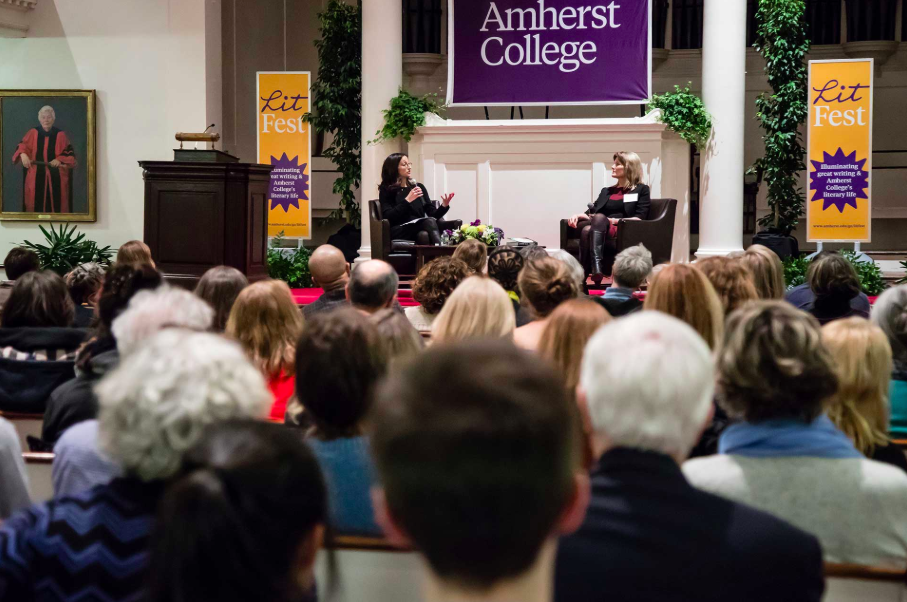
JA: Over the course of LitFest, there has been a discussion about the importance of finding your readers, the people who are going to read your early drafts and give you feedback. I wonder if you could say how you found your readers, and what you expect of each other?
JE: That’s a good question. I’m in a writing group, which has just had a kind of organic identity that has remained constant even when the people change. We only read aloud, so there’s no homework, which I really believe in. Storytelling began as an oral tradition, and it’s great to hold it to that standard. It forces us to really pay attention to the music and the rhythm of the language. Then there are also friends that I show things to who are not in that group who are not always writers. One of my oldest friends is one of my readers, and she always says, ‘I’m the common man! I’m just a reader!’ and she’s really helpful. I’ll hear any opinion, because I really believe that the reader is always right.
JA: What was your research process like for Manhattan Beach?
JE: I got involved in a sort of formal oral history project for Manhattan Beach, with the Brooklyn Historical Society, the Brooklyn Navy Yard, and myself, combining to interview everyone we could find who had worked at the Navy Yard. What I learned in that process was that the kind of interviewing I was used to doing as a journalist was actually very poorly suited to oral history interviewing. Oral history interviewing has very clear rules, one of which is not to push people in any direction, to just let the story come in whatever form and with whatever details and taking however long it needs to take. Often the most helpful information and details were not the things I was trying to corral people toward. Since finishing Manhattan Beach, I feel I’ve taken a more oral history approach now as a journalist. I just shut up, just let people talk, and see whether some other shape might emerge that my nudging could actually end up obscuring.
JA: I want to ask you about the experience of Manhattan Beach being read as part of the One Book, One New York program, where all of New York City was encouraged to read Manhattan Beach. Did anything unexpected come out of that? Did you learn something about the reading habits of New Yorkers?
JE: First of all, it was just so exciting to have that happen, because the book is kind of a love letter to New York. I didn’t grow up in New York, but it’s my chosen home, and I love it so profoundly. One of the great joys of working on Manhattan Beach was that it woke up the physical city for me in a new way. For example, both of my sons played baseball, and their games would take me all over the five boroughs, to places I had never been, often on the water. I would watch these ships go by, and I felt aware of New York’s past, and its watery center, in a way I hadn’t before.
If there was any discovery that came of One Book, One New York, it was how many people feel connected to the war still, often through their parents or grandparents, many of whom worked at the Navy Yard. The Navy Yard had been decommissioned long before I got to New York, and it was a catastrophe for Brooklyn when that happened in ’68. It destroyed the neighborhood completely. There were so many ancillary businesses—there were something like 200 uniform shops in the area when the Navy Yard was still in operation.
I think we all feel the preciousness of this moment, too, because it is about to disappear from living memory. We have ten to twenty more years of people who vividly remember World War II. Virtually every person I interviewed for this book has passed away.
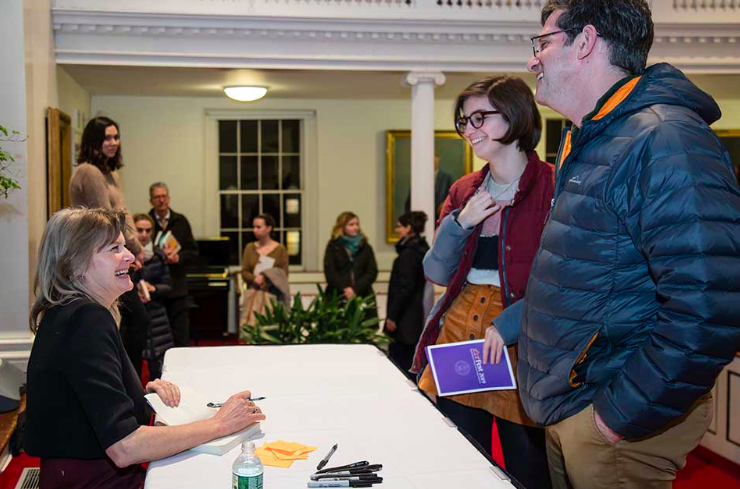
JA: One of Anna’s lines that I particularly noted was when she’s turned down from an opportunity to advance in her career, and she comments to herself that “feeling undeserving was less terrible, somehow, than feeling cheated.” Were you thinking of any sort of contemporary echoes of Anna’s plight when you were writing her, or thinking about any gendered experiences of your own life?
JE: Anna is despised in the diving program at the Navy Yard at first—she’s only allowed in it because the man running it thought that her ability to do certain things would be a good way of tormenting the men. Then he can’t get rid of her for various reasons, and so she’s hated. There are moments where she feels rage, but at other moments she feels tremendously weak. She feels that she’s nothing, that this is an appropriate response to her, and that gives her this odd comfort. I remember when I wrote it I thought, ‘I understand that.’ But I wasn’t really expecting it—it was exactly the kind of surprise that I hope for when I’m writing. And it certainly resonates with me, but I couldn’t tell you exactly why. And if I could I probably wouldn’t have written it, because then it would seem like I was writing about my own experience.
Talking about gendered experience and this book is interesting. Manhattan Beach came out a month before #MeToo happened. When I was working on it, I thought ‘wow, it’s really lucky that I’m setting this in the 40s because I want to write about gender and female strength and the difficulties that it encounters in the world, but it would be so hard to do that in contemporary times, because these kinds of problems are behind us.’ For example, women weren’t allowed on ships in the Brooklyn Navy Yard for the first couple of years that they worked there, and the fear was that in these very tight spaces on ships, men might not be able to control themselves. We now know that we have not quite solved that problem in the workplace. Well, we knew that all along, but not in quite as dramatic terms as became clear with #MeToo.
JA: What were the books that inspired you to become a writer?
JE: If I had to pick one, it would be Edith Wharton’s The House of Mirth. I think a lot of the things Edith Wharton does in that book are things I still strive for—to have intelligence and complexity and humor, even on the smallest structural level, on the level of the sentence, and then the paragraph, and then the chapter, and to be full of pathos. I mean, it’s an out-and-out tragedy, and yet so funny. Multiple points of view, tremendous sympathy for everyone—even characters who are doing bad things—and it feels timeless in its relevance to the question of female physical appearance and power. It addresses how those things have a kind of currency in the culture, but emphasizes the dangers of relying on that currency, and the difficulty of converting it into actual currency without making sacrifices that one may not want to make.
Jennifer Egan is the author of several novels and a short story collection. Her most recent novel, Manhattan Beach, a New York Times bestseller, was awarded the 2018 Andrew Carnegie Medal for Excellence in Fiction. Her previous novel, A Visit From the Goon Squad, won the 2011 Pulitzer Prize, the National Book Critics Circle Award, and the Los Angeles Times book prize. Also a journalist, she has written frequently in the New York Times Magazine—most recently about pregnancy and childbirth among opioid-dependent women. She is currently the President of PEN America and Artist-in-Residence at the University of Pennsylvania.
Jennifer Acker is founder and editor-in-chief of The Common. Her short stories, essays, translations, and reviews have appeared in LitHub, The Washington Post, n+1, Harper’s, and Ploughshares, among other places. She has an MFA in fiction and literature from the Bennington Writing Seminars and teaches literature and editing at Amherst College. Her debut novel, The Limits of the World, comes out on April 16th, 2019.
